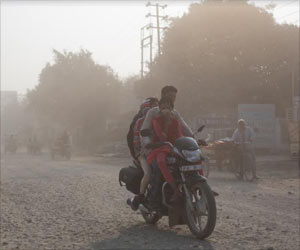In Bengaluru, school goers are among the worst affected, due to the exposure to severe toxic hours during the peak traffic hours.

TOP INSIGHT
In Bangalore, if you are traveling in an open vehicle during peak traffic hours you are likely to be exposed to severe toxic air
With an existing fleet of seven million vehicles, nearly 900 new vehicles are added to the Bengaluru's roads every day.
Worsening the problem, says the report, is illegal dumping of waste mixed with mass untreated sewage.
The city generates around 4,500 to 5,000 tonnes of waste per day, by conservative estimates.
The city has 10 online monitoring stations, of which five were introduced in January with an additional feature to generate Air Quality Index.
Taking up the cudgels to check the alarming pollution levels, the report says residents of Whitefield Rising in Mahadevapura in November last year tested the air quality in the morning in their locality.
Sudhir, who is based in Bengaluru, told IANS that the residents initiated a daily activity to clean up roads by hiring a vacuum cleaner and demonstrated that this is indeed possible.
They have been spending money on and off to get the roads cleaned. They have approached the local municipality and the pollution control board to regularise it. So far that hasn't happened.
Likewise, residents of Malleshwaram have started taking the initiative to tackle the problem of burning leaves, another major cause of air pollution, in their locality by composting in their gardens or empty plots.
Quoting Jayadeva Institute of Cardiovascular Sciences and Research cardiologist Rahul Patil, the report says: "After eliminating stress and dietary habits, we found cab and auto drivers were the worst hit as they remain stranded for long hours in bad traffic and are exposed to high levels of pollution."
Co Media Lab Director Pinky Chandran told IANS that unlike New Delhi and other cities, Bengaluru fortunately has many citizen-action groups that are championing the cause of clean air.
"The state needs to take its citizens into confidence and formulate an implementable action plan which is based on air quality data so that it can bring about change," she said.
A seven-day air quality monitoring exercise taken up by Co Media Lab and Climate Trends this month found that the particulate matter averages observed over four hours during peak time in the morning and evening were consistently above 200 micrograms per cubic metre, indicating very poor air quality levels.
Climate Trends works on solutions to air pollution, while Co Media Lab is a community media lab. Both are based in Bengaluru.
Source-IANS
 MEDINDIA
MEDINDIA




 Email
Email




